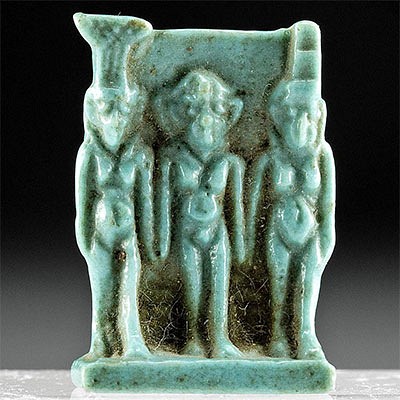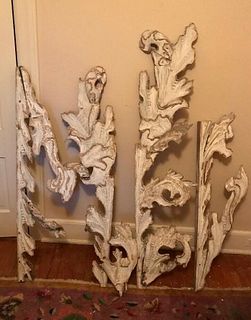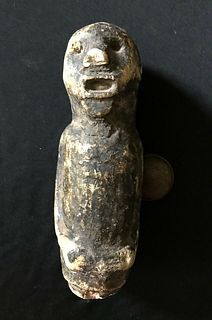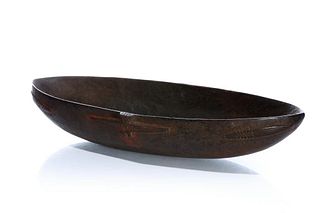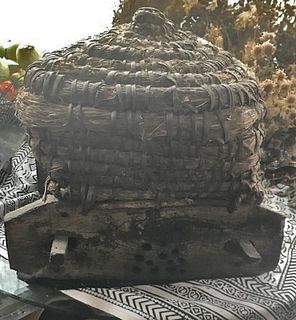Early 20th C. African Baule Wood Heddle Pulley
Lot 244
About Seller
Artemis Gallery
686 S Taylor Ave, Ste 106
Louisville, CO 80027
United States
Selling antiquities, ancient and ethnographic art online since 1993, Artemis Gallery specializes in Classical Antiquities (Egyptian, Greek, Roman, Near Eastern), Asian, Pre-Columbian, African / Tribal / Oceanographic art. Our extensive inventory includes pottery, stone, metal, wood, glass and textil...Read more
Estimate:
$900 - $1,350
Absentee vs Live bid
Two ways to bid:
- Leave a max absentee bid and the platform will bid on your behalf up to your maximum bid during the live auction.
- Bid live during the auction and your bids will be submitted real-time to the auctioneer.
Bid Increments
| Price | Bid Increment |
|---|---|
| $0 | $25 |
| $300 | $50 |
| $1,000 | $100 |
| $2,000 | $250 |
| $5,000 | $500 |
| $10,000 | $1,000 |
| $20,000 | $2,500 |
| $50,000 | $5,000 |
| $100,000 | $10,000 |
| $200,000 | $20,000 |
About Auction
By Artemis Gallery
Aug 5, 2021
Set Reminder
2021-08-05 10:00:00
2021-08-05 10:00:00
America/New_York
Bidsquare
Bidsquare : VARIETY SALE | Antiquities & Ethnographic Art
https://www.bidsquare.com/auctions/artemis-gallery/variety-sale-antiquities-ethnographic-art-7292
Featuring classical antiquities, ancient and ethnographic art from cultures encompassing the globe. Egyptian, Greek, Roman, Etruscan, Near Eastern, Asian, Pre-Columbian, Native American, African / Tribal, Oceanic, Spanish Colonial, Russian, Fossils, Fine Art, more! Artemis Gallery info@artemisgallery.com
Featuring classical antiquities, ancient and ethnographic art from cultures encompassing the globe. Egyptian, Greek, Roman, Etruscan, Near Eastern, Asian, Pre-Columbian, Native American, African / Tribal, Oceanic, Spanish Colonial, Russian, Fossils, Fine Art, more! Artemis Gallery info@artemisgallery.com
- Lot Description
West Africa, Ivory Coast, Baule tribe, ca. early 20th century. A finely carved wooden heddle pulley depicting a standing nude female atop, with an explicitly delineated spine and a plaited, lobed coiffure. In addition, the u-shaped form below is intricately incised with stylized linear and geometric motifs. Heddle pulleys traditionally have been used for strip-weaving narrow cloth strips that were then stitched together to create a large textile. Used in pairs, they hold the heddles in the loom in place to make the weaving process easier, allowing the artisan to shift the warp threads, making it possible for the weft thread shuttles to pass through. Many of the pulleys are designed as animals or humans, like this example, as if the figure were to be watching over and protecting the weavers while they worked. Size: 10.125" H (25.7 cm)
Provenance: private Morrison, Colorado, USA collection
All items legal to buy/sell under U.S. Statute covering cultural patrimony Code 2600, CHAPTER 14, and are guaranteed to be as described or your money back.
A Certificate of Authenticity will accompany all winning bids.
Replace: PLEASE NOTE: Due to recent increases of shipments being seized by Australian & German customs (even for items with pre-UNESCO provenance), we will no longer ship Replace: most antiquities and ancient Chinese art to Australia & Germany. For categories of items that are acceptable to ship to Australia or Germany, please contact us directly or work with your local customs brokerage Replace: firm.
Display stands not described as included/custom in the item description are for photography purposes only and will not be included with the item upon shipping.
#163145Chips around periphery of perforations through lower end. Normal surface wear with scattered earthen deposits, particularly in recessed areas. Wood has developed a lustrous patina, especially on breasts, navel, knees, and other high-pointed areas.Condition
- Shipping Info
-
All shipping is handled in-house for your convenience. Your invoice from Artemis Gallery will include shipping calculation instructions. If in doubt, please inquire BEFORE bidding for estimated shipping costs for individual items.
-
- Buyer's Premium



 EUR
EUR CAD
CAD AUD
AUD GBP
GBP MXN
MXN HKD
HKD CNY
CNY MYR
MYR SEK
SEK SGD
SGD CHF
CHF THB
THB




